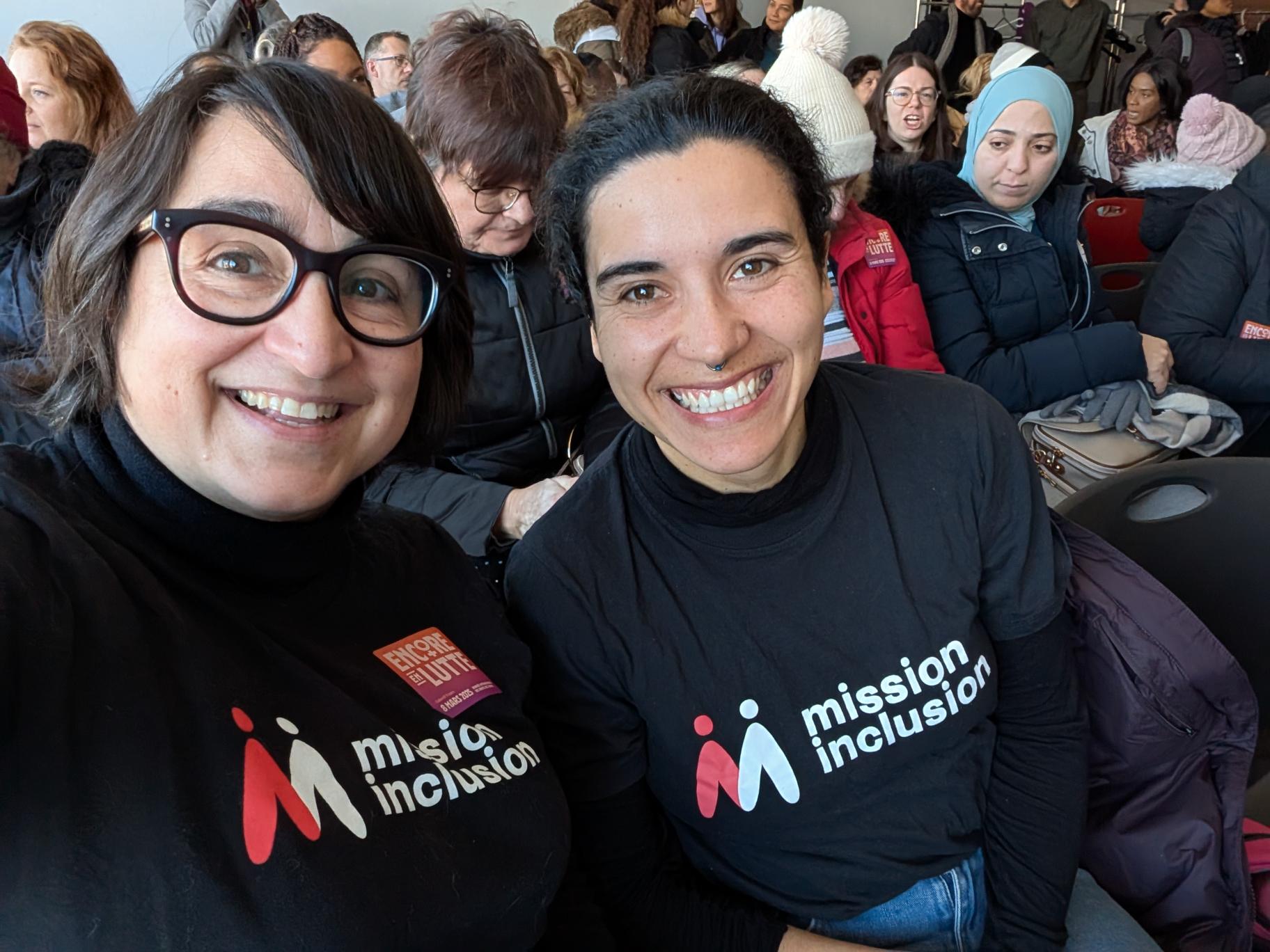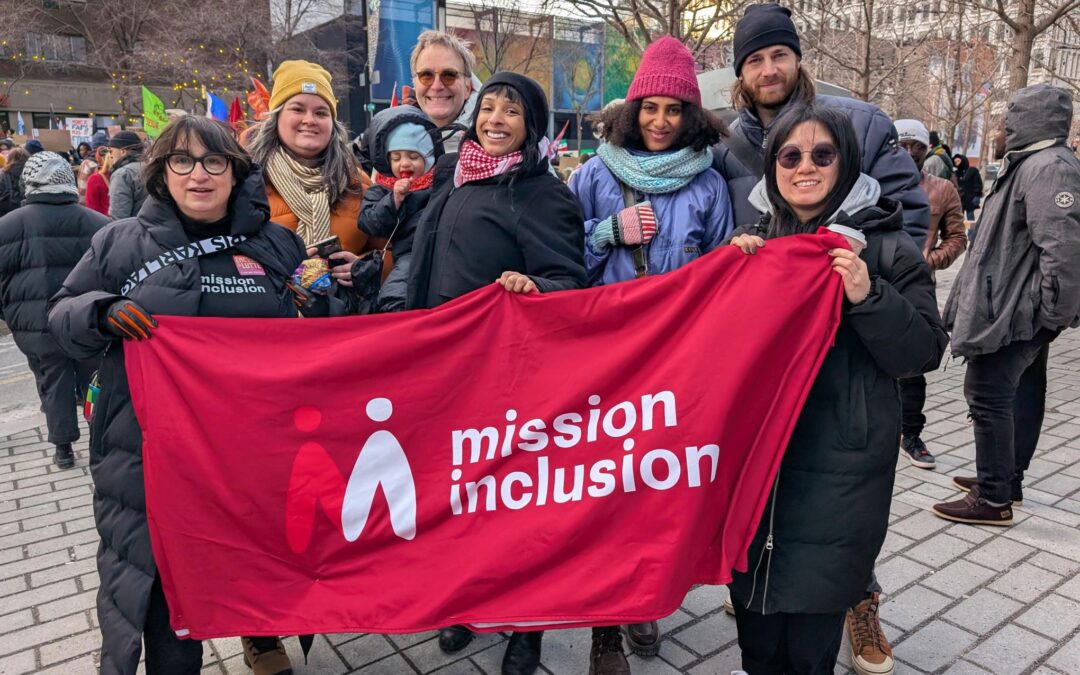Have you been following our social media activities this month? March was marked by several important initiatives to mark International Women’s Day and continue our commitment to gender equality. In a global context where women’s rights face growing challenges, collective mobilization is more important than ever.
“Voices of Inclusion”: Dialogues and conversations with our team
For the first time, we launched
“Voices of Inclusion,” an initiative that creates a space for dialogue and conversation with our international team.
“Voices of Inclusion,” an initiative that creates a space for dialogue and conversation with our international team.
For March 8, our colleagues from Quebec, Haiti, and Kenya participated in rich discussions around three main questions:
► What does International Women’s Day mean to you?
► How do you perceive the evolution of women’s rights in your context?
► What experiences of female solidarity have had an impact on you?
These conversations revealed diverse but complementary perspectives on past struggles, current challenges, and hopes for the future.
“Voices of Inclusion”: Dialogues and conversations with our team
For the first time, we launched “Voices of Inclusion”, an initiative that creates a space for dialogue and conversation with our international team.
For March 8, our colleagues from Quebec, Haiti, and Kenya participated in rich discussions around three main questions:
► What does International Women’s Day mean to you?
► How do you perceive the evolution of women’s rights in your context?
► What experiences of female solidarity have had an impact on you?
These conversations revealed diverse but complementary perspectives on past struggles, current challenges, and hopes for the future.
Our contribution to the dossier on female leadership in Le Devoir
Mission inclusion participated in the special report on female leadership in Le Devoir, highlighting the importance of international solidarity in the context of the decline in women’s rights.

Our advertorial presents three key aspects of our work with our partners:
► Strengthening women’s leadership and entrepreneurship in Kenya
► Improving access to healthcare for women in Haiti
► Supporting community initiatives that empower women in Quebec
Our contribution to the dossier on female leadership in Le Devoir
Mission inclusion participated in the special report on female leadership in Le Devoir, highlighting the importance of international solidarity in the context of the decline in women’s rights.

Our advertorial presents three key aspects of our work with our partners:
► Strengthening women’s leadership and entrepreneurship in Kenya
► Improving access to healthcare for women in Haiti
► Supporting community initiatives that empower women in Quebec
ReSea: When women take leadership of the blue economy
The ReSea project in East Africa is a powerful example of how women transform their communities and the environment. In celebration of International Women’s Day, our partners and colleagues shared inspiring messages about women’s essential role in the blue economy.
Glory Mbia, Gender Coordinator for ReSea WFT-T (Tanzania)
This project, supported by Global Affairs Canada and jointly implemented by Mission inclusion and the International Union for Conservation of Nature, demonstrates how women’s empowerment has a direct impact on:
► Protecting marine biodiversity
► Building community resilience in the face of climate change
► Economic independence for women in coastal areas
ReSea: When women take leadership of the blue economy
The ReSea project in East Africa is a powerful example of how women transform their communities and the environment. In celebration of International Women’s Day, our partners and colleagues shared inspiring messages about women’s essential role in the blue economy.
Glory Mbia, Gender Coordinator for ReSea WFT-T (Tanzania)
Mobilized for women’s rights and the environment
Our commitment was demonstrated by our active presence at several significant events during the first week of March.
On Friday, March 7, we participated in a march organized by our partner organization, Table Osez au Féminin, in Montréal-Nord. This local action brought together approximately fifty people determined to highlight the reality of domestic violence affecting their community.
Alongside neighbourhood residents, we marched with banners created by women during creative workshops. A highlight of the event was the unveiling of a collective sculpture on display outside the Maison Culturelle community — a poignant tribute to the 25 women who were victims of femicide in Quebec in 2024.
Sofia Urrutia, our knowledge mobilization advisor, who participated in this March.


In Montreal North: against violence against women
Mobilized for women’s rights and the environment
Our commitment was demonstrated by our active presence at several significant events during the first week of March.
On Friday, March 7, we participated in a march organized by our partner organization, Table Osez au Féminin, in Montréal-Nord. This local action brought together approximately fifty people determined to highlight the reality of domestic violence affecting their community.
Alongside neighbourhood residents, we marched with banners created by women during creative workshops. A highlight of the event was the unveiling of a collective sculpture on display outside the Maison Culturelle community — a poignant tribute to the 25 women who were victims of femicide in Quebec in 2024.
Sofia Urrutia, our knowledge mobilization advisor, who participated in this March.


In Montreal North: against violence against women
The March 8 demonstration in the city center
On Saturday, March 8, International Women’s Day, our team attended the annual demonstration in downtown Montreal, responding to the call of the March 8 Collective under the theme
“Still in Struggle.”
“Still in Struggle.”
At the call of Mothers at the Front for Climate Justice
Also, on March 8, 12,000 people across Quebec responded to the call from Mothers to the Front for Climate Justice. Our Executive Director, Richard Veenstra, participated in this mobilization and joined this initiative, which highlights the close links between environmental issues and women’s rights.
Diverse realities, a common cause
A central observation emerges from all our activities in March: although women’s realities vary considerably depending on the context, their struggles share common elements. From Quebec to Haiti, including Kenya, we find recurring themes:
► The need for active solidarity
► The importance of economic autonomy as a vehicle for emancipation
► The need to make women’s voices heard in decision-making spaces
This perspective enriches our daily work and reinforces our conviction that international solidarity is essential for advancing women’s rights.
The month of March continues, and with it, our commitment to women’s rights. Beyond the annual celebrations, Mission inclusion continues to work with its partners to build a just and inclusive world.

